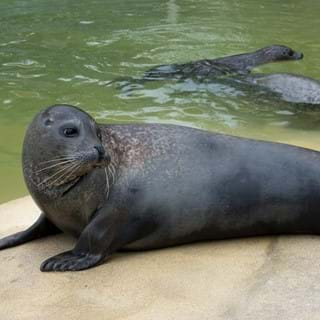Meet our Common Seals

Bo
Bo was born at the Cornish Seal Sanctuary on 29th June 2013, likely making his 35-year-old dad, the oldest Common seal to father a pup in Europe!
Bo is a very stubborn little seal and likes to test the patience of his trainers, often making it feel like he is training them!
While his favourite activity is retrieving toys from the water, Bo will occasionally, albeit reluctantly, come over for a quick belly rub!

Buddy
Buddy was born at the Sanctuary on 13th July 2014.
He's is always the first one to come and say hello and is very eager during in training sessions!
Buddy enjoys keeping the other seals in check, having a quick glance every now and again to make sure they are where they are supposed to be! Buddy’s favourite thing to do is to play with dog toys, he gets very excited throwing them around…but only when he thinks no one is watching.

Jarvis
Jarvis was rescued just off the coast of Porthminster, Cornwall in September 2016.
He was underweight and completely blind in both eyes. This visual impairment meant that he could not be released and earned him a permanent home here at the Sanctuary.
Jarvis is quite shy compared to the other seals but that doesn’t stop him excelling in his training. He enjoys getting piggy backs from the other seals and his favourite thing is Hawaiian music, especially the soundtrack to Lilo & Stitch!
Common Seals
Meet Buddy, Bo and Jarvis, our resident Common Seals at the Cornish Seal Sanctuary. They are fun and friendly creatures and love to target feed with the animal care team. What is particularly special about our Common Seals is that Bo and Buddy are brothers!
Did you know?
- Common seals spend 85 % of their day under the water, which includes resting on the sea floor
- Female Common Seals give birth to a single pup during June or July
- Pups shed their white coat whilst still inside the uterus, so they are born with their adult coat
- Common seals will swim into estuaries and large streams in pursuit of prey
- The average heart rate of an adult seal is between 55 and 120 beats per minute. When underwater, the heart rate is slowed to between 5 and 15 beats which enables them to dive for up to half an hour

